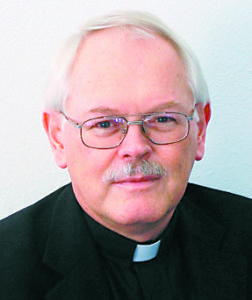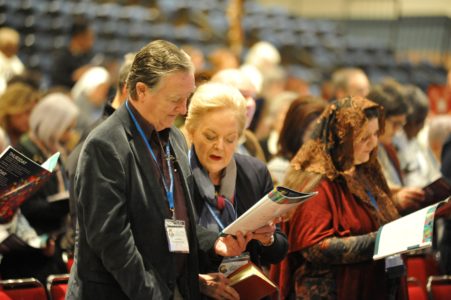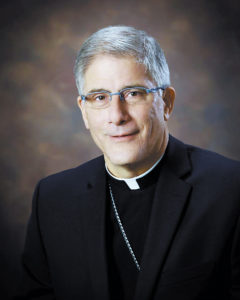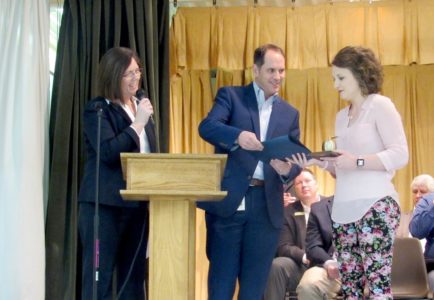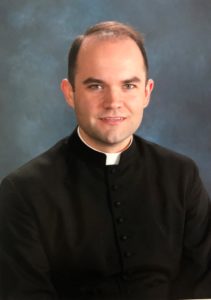
Father Aaron Williams
SPIRIT AND TRUTH
By Father Aaron Williams
Last month, the nation paid witness to the state funeral of President George H.W. Bush. It was a solemn occasion, especially the funeral service itself, held in the Episcopalian National Cathedral in Washington, D.C. But, watching this funeral service, I was reminded of a funeral of another president that happened a several years before I was born — yet one I have been able to watch online (more than once).
When President John F. Kennedy was assassinated in 1963, an event occurred in this nation that has never occurred before nor occurred since: the state funeral of a Catholic president. But, that funeral Mass in comparison to many of the more recent funerals of non-Catholic presidents, is actually pretty disappointing. It was a Pontifical Low Mass. We don’t really have those distinctions anymore, but before the liturgical reform after the Second Vatican Council there was a classification of different types of Masses which most people just called “Low” or “High” Mass.
In a high Mass, everything is sung. Sometimes you even have a solemn high Mass when the priest is assisted by a full gambit of ministers — a deacon and a subdeacon. But, in a low Mass nothing is sung — or at least, nothing of the texts of the Mass itself are sung. They are all spoken by the priest: the readings, the dialogues, the chants. All spoken. Exceptions were made in the early 1900s to allow vernacular hymns to be sung over the Mass itself while the priest spoke the actual texts of the Mass simultaneously.
And, this is the state funeral that was given to President John F. Kennedy. A low Mass, celebrated by a bishop (and therefore a ‘pontifical’ low Mass). One can go online and look up the video and hear Cardinal Cushing rattle off the Latin of the Mass in his Bostonian accent while various operatic voices sing settings of “Ave Maria” over and over again. The most comedic moment, in my opinion, is when the organ plays a light interlude during the procession as Cardinal Cushing walks down the aisle holding a piece of letter paper and mumbling the words of Psalm 51 to himself in pace so fast that it is entirely unintelligible.
The Second Vatican Council, in promoting the renewal and restoration of the Sacred Liturgy desired that elements of the liturgy be simplified, not so that the liturgy may become lackluster but so that the solemn liturgy would be more readily available to the faithful in the average parish. But, has this been the result?
Despite my harsh critique of President Kennedy’s funeral Mass, most Catholics alive today have never experienced anything more than a low Mass — or at least its equivalent. At best, they have experienced some elements of the solemn liturgy using sparingly on really important feast days. But the true solemn liturgy, the liturgy which was so earnestly promoted by the Second Vatican Council, has all but disappeared in the world today. Instead, most parishes always speak all the texts of the Mass, and then the choir tosses a few choice hymn over the Mass for good measure. Its really just a low Mass.
But, one remarkable thing that is being seen today is that, especially amongst young people, a trend is developing of a desire to restore the solemnity to the Sacred Liturgy. And, people are quick to try to make this into a political argument. They say that young people today are “romantic” over an “ideal” liturgical time that really didn’t exist. They want to “return” to something that they don’t really know about.
But, the reality that I have experienced in young people today is really quite different. Young people want a higher bar. They are not looking to turn back the clock. In fact, they are looking to go even further — and to see the vision of the Second Vatican Council fully realized. But that vision, when you actually look at the documents of Vatican II, is far different than what we have today or what we might imagine. It is certainly not a Pontifical Low Mass.
The solemn liturgy of the Church makes use of the greatest meeting of tradition and culture imaginable. Tradition, because the liturgy employs elements from ancient Christianity, yet hands them on to us polished and ready to be used again; and, culture, because the liturgy takes the best of modern talent and efforts and makes them fitting for sacred worship as well.
Over the next few articles, I would like to delve into the elements which the Second Vatican Council itself proposed as necessary to the solemn liturgy — why they are necessary, why we should seek to promote them, and how that can be done.
(Father Aaron Williams is the parochial vicar at Greenville St. Joseph Parish and serves as the liaison to seminarians for the Office of Vocations.)

